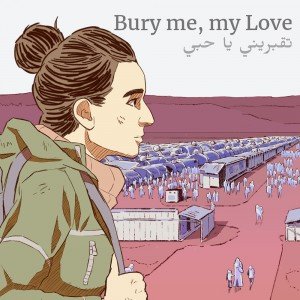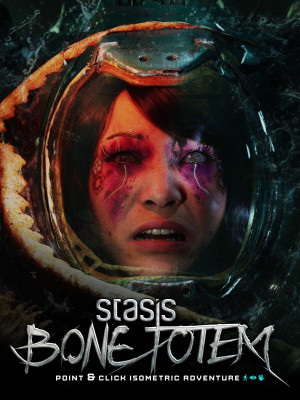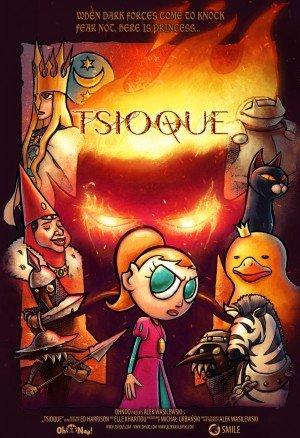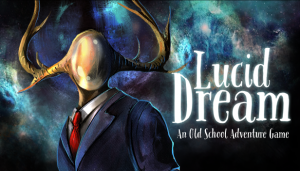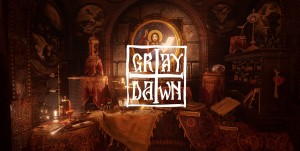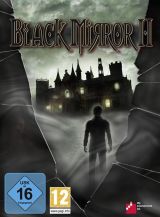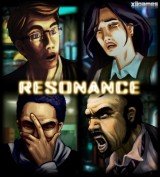Review for Bury me, my Love page 2
Initially I began playing the text-based narrative adventure Bury me, my Love with a real lack of awareness, and some trepidation. As an Australian I am, geographically speaking, far removed from people who have left, and continue to leave, their homes in Syria to escape the nearly eight year long civil war that is still ongoing. Because of this, and a noticeable absence of Syrian refugee voices in the media, it was not until I played this game that I realised what I did know about their lives was very little at all. If the developer’s aim was to rid me of some of my ignorance, then this they have certainly accomplished. BMML is far more than just an important story and lesson in cultural understanding, however. It is an excellent game in its own right, with nearly twenty potential endings and a large number of branching storylines to keep your interest much longer than the few hours it takes to complete the first, probably imperfect, playthrough.
Bury me, my Love sees you take on the role of Majd, a shopkeeper from Homs (a Syrian city) who uses a text message app to communicate with his wife Nour throughout her perilous journey to Europe for asylum. Majd offers both advice and support to Nour on her quest, and it is through clickable text options that you choose how he responds to her. The suggestions you make often have profound and weighty consequences, including the path Nour takes and where she ultimately settles, making it unlikely that two different players will experience events the same way or achieve the same outcome. If there is one thing that is constant in BMML, however, it is the powerful connection between Nour and Majd. As the young couple communicates with expressive love hearts, kissing face emojis, and abbreviated text slang like “Ttyl,” they are easy to relate to regardless of their circumstances. Majd stays in Homs throughout the game and as the distance between them grows, so too does our concern and determination to lead them through their hardship to a place where they can be reunited in a land free from war.
These themes of migration, asylum, love and war are all explored. In one possible journey, Nour finds a moment of respite in an Austrian hotel and texts Majd to talk about how she is beginning to notice the absence of noise there, saying that it scares her. She confides in him her realization that she has become so used to the sounds of engines, protesters and bombs that she has forgotten how to feel comfortable with silence, with peace. Majd never fails to support his stoic wife, reassuring her as best he can that such things will come back to her in time, but Nour wonders if this is true, and if she will ever find comfort now that there is no place left that to call home.
The player must also learn to be comfortable with silence. Aside from the constant peaceful blipping of Nour’s messages, most of the experience is without audio in the traditional narrative style. When music is played, it is usually brief and used to signal a change in Nour’s situation. A positive turn of events may result in a few pleasant moments of soothing acoustic guitar, or in less ideal circumstances the foreboding sound of bass strings solemnly thrumming. When issues do become evident, the atmosphere can become quite palpable and there are moments when we fear not only for Nour, but also for Majd, who is powerless to protect his wife in cases of great danger.
Hope, no matter how wishful, is ever-present. At one stage I felt very optimistic when Nour planned to cross into Croatia using a map of supposedly unguarded areas along the border. But this hope soon gave way to tense concern when Majd recognized the map as one depicting places where landmines had been laid along the border in the early ‘90s. It’s too late though: Nour is already in the field and responds to his horror with, “Like I said: Where they’re not guarding the border.” Luckily, it seems that no matter how misguided or ill-informed, your decisions cannot result in Nour’s death. Make no mistake though, a few errors of judgement are enough to see her robbed or hospitalised, and I’m sure there are many other dire events that I have not unearthed even after my fourth time through.
Even with its perils, Bury me, my Love still endeavours to be light-hearted at times, and Nour’s journey is frequently broken up with short interludes of heartfelt, good-humoured banter with Majd. These moments, such as when Nour frequently misspells the word “Flippant” as “Flip-Flop” as a result of her phone’s auto-correct, are very endearing. At another point Majd, who is livid with Nour for putting herself in danger, illustrates that he is not as skilled as her with technology when he struggles to vent his frustration using a large number of emojis.
Advising Nour is always a dilemma, and rarely do you receive enough information to feel confident that your choices will lead to a better outcome than any other alternative. Because Majd is never with Nour to get a real feel for her situation, he (and you) are forever partly in the dark. In truth, we see nothing of Nour’s situation bar the occasional photo message, creating a system where the blind lead the blind in making choices that, in reality, would carry monumental risks. It is hard to believe, for example, that having Nour walk through a minefield is a better option than crossing the Mediterranean by boat. Other choices are morally simpler but nonetheless as challenging. Should Nour hide her money in her clothes or her shoes? The decision requires a great deal of thought if you haven’t yet formed a picture of what you believe Nour’s journey will involve.
Matters of trust are also real conundrums. Though Majd is a fountain of wisdom when it comes to geopolitics and history, he never actually meets anyone Nour talks to. And yet despite this he is often asked for his opinion about whether to trust others in her vicinity. At one stage Nour inquired whether she should go with someone who claimed he could sell a fake but convincing French passport. Soon after I was asked whether she should give a heap of money to a man who promised to release it to his smuggler friend only after the smuggler delivers her safely to the Greece-Bulgaria border. Scenarios such as these made me very reluctant to trust anyone Nour met, oddly enough even those she was willing to put her faith in. Although a considerable amount of caution for Nour’s safety is without doubt healthy and warranted, it is also the case that too little trust will lead to an arduous journey, making it nigh impossible to get her out of the dangerous positions she is almost invariably in.
Even the simplest of decisions have game-changing effects, and they are often less obvious than they seem. Remaining supportive of Nour, for instance, is vital to her morale, while being emotionally distant or persistently second-guessing yourself can have serious implications for her journey and where she ends up. She also carries an inventory that you cannot access, but which she updates you on when the need arises, such as some money, basic necessities, and also her Syrian passport. Losing these items has weighty implications and a mistake that sees Nour’s belongings stolen will make it very difficult to continue the journey if events arise where money or identification is required.
Because of all these very real concerns, my first playthrough was a hesitant and overly-cautious one, and as a result of such scepticism this attempt saw Nour through to Germany but hauled back to Bulgaria, where she was settled due to an error I made earlier on. Nour’s unhappiness was made clear to me in one final voice message signalling the end of the game – the only time you ever hear a voice throughout. I got the definite sense at this point that, despite succeeding in getting Nour out of Syria, Bulgaria was still a “bad ending” since Nour is ill-treated by the authorities and made to sign registration forms in a language she does not understand.
In my second playthrough, I saw Nour detour through Aleppo early in the game. Although I expected this to bring the game to a swift conclusion, it is to the credit of the designers that she actually went on to succeed well beyond my first try after being assisted by the Doctors Without Borders NGO and helped out of the country. This second ending, which saw Nour get to Germany without issue, is still bittersweet, however, as the process of granting a request for asylum is a lengthy one. I was left with a pleasant sense of optimism this time, but, true to life, it offered no real closure or certainty over whether Majd and Nour had succeeded. Honestly, I appreciated this conclusion, which again showed the writers were committed to providing a realistic portrayal of what an application for asylum involves, instead of succumbing to truth-be-damned, feel-good endings.
Finishing the game invites you to restart the journey in the hopes of improving Nour’s fate. An average playthrough clocks in at around three hours, give or take an hour depending on your route and the time you take weighing your options. I found it worthwhile before replaying to consolidate what I had learned and also take the opportunity to go through some of the other features of Majd’s phone that can be accessed for additional information. There is a map app, very similar to Google Maps, which traces Nour’s path and helps you visualise her route and also includes geographical and historical information about places she has visited along the way.
Majd’s phone also catalogues photo messages you receive from Nour, which are worth looking back through. Usually when you receive a new photo or image from her, it casually fades into the background (behind the phone screen) to replace the last photo you received. These images are all illustrations in a visual novel style and include photos of Nour, the people she meets, and places she visits. They complement the experience well, and although they are often pictures of refugee camps or buildings turned to rubble, they still do a good job of adding colour to a dialogue-heavy game. Some of the graphics are actually very pretty, such as a quaint street from a Syrian cultural district in Istanbul, and the outside view of grass moving alongside a train to Salzburg. If there is any issue with the artwork in BMML, it is that there’s just not enough of it, as every once in a while I started to feel that the time between backgrounds was becoming less frequent. In saying that, the less you can “see” of Nour’s surroundings, the more the writing and your imagination are allowed do their jobs, which can be good thing given the high-quality dialogue.
BMML definitely requires a degree of compassion and open-mindedness to enjoy. Without it, some might struggle to connect with Majd and Nour and misinterpret the uncomfortable reality it presents as something politically motivated. And yet it would have been very easy for a game like Bury me, my Love to fall into the trap of trying to make a statement and beating the player about the head with it at every opportunity. One of the greatest things about the game, however, is that it never once does this or tries to influence your views. It is simply a story based on detailed accounts of real refugee experiences – which are never inherently political. In this way, BMML fairly invites others to explore unfamiliar themes through an interactive medium and offers you the chance to confront the assumptions you may hold.
Bury me, my Love is a breath of fresh air, but it is also a cold, sobering wind blowing through the window it opens into the lives of those who have left war in pursuit of a peaceful life. Its lack of any real gameplay or puzzles certainly won’t appeal to everyone, but its mind-broadening, heart-warming story will benefit many. So whether you already have an interest in the rich themes it explores, or simply possess a passion for purely narrative-driven adventures, give this game a go to spend some time in the shoes of Majd and Nour.


